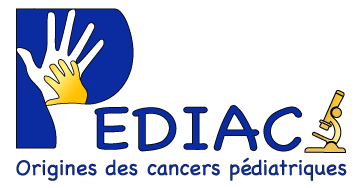RESEARCH TeAM Thomas Mercher
Acute megakaryoblastic leukemia
Thomas Mercher is leading the team “Biology of pediatric leukemia” within the INSERM U1170 localized at Institut Gustave Roussy. The team has a strong expertise in pediatric acute megakaryoblastic leukemia (AMKL). The team has worked both on Trisomy 21 AMKL (DS-AMKL) and de novo AMKL and has played a crucial role for understanding their pathogenesis with the discovery of JAK mutations in DS-AMKL, and of the OTT-MAL and ETO2-GLIS2 translocations. The team has modelled the OTT-MAL and ETO2-GLIS2 in mice and have developed PDX from patients to better understand the pathogenesis of AMKL and to develop new therapeutic approaches. The team is expert in the molecular approaches and in the interpretation of the data generated by RNAseq, single cell RNAseq, ChIPseq, ATACseq.
The team has established collaborations with various clinical services including through the CONECT-AML network and the close-relationship with the MyeChild01 protocol that includes France, UK, Switzerland and Australia (UK PI: Prof. Brenda Gibson, French PI: Prof. Guy Leverger).
As part of these network, the team have access to primary human pediatric AML samples. We have also access to the ELAM02 national biobanking initiative of French pediatric AML (Biobank coordinator: Prof. Hélène Lapillonne). This project will benefit from our established capacity to derive patient-derived xenograft (PDX) models derived from these primary samples. This includes 9 models of already developed pediatric AMKL PDX models and 9 other models of other pediatric AML subtypes developed as part of MAPPYACTS (Relapse childhood cancer, coordinator: Prof. Birgit Geoerger) and CONECT-AML.
In the context of this project, the team have obtained a proof-of-principle that ontogenic differences during hematopoietic development controls both phenotype and aggressiveness in a murine model of leukemia initiation with a poor prognosis-associated fusion oncogene (Lopez et al, Cancer Discovery 2019). This provides a solid ground for the current project that will further dissect the molecular bases for this observation. The team’s contribution to the project will be to analyse primary AML samples through single cell analyses to obtain appropriate data to investigate leukemia, stromal and immune component heterogeneity (WP2). For the study of AML, this will be performed in close collaboration with V. Maguer-Satta in the team of JY Blay presenting expertise in stromal contribution to cancers. In addition, the team will extend the studies to human cell-based models. Models and patient cells derived data will be directly compared to focus functional studies on the most relevant mechanisms. Screening approaches in the WP3 will be perform with the goal to identify molecular vulnerabilities and mechanisms modulating disease initiation using a human IPSC model.
